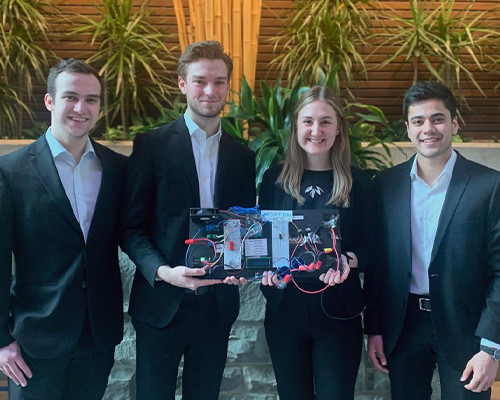Bailey Thompson, BESc’22, Bruce Gillespie, BESc’22, Adam Kidd, BESc’22 and Parth Vachharajani, BESc’22

Global Winner, Engineering category
When four engineering students began working on their capstone project for their engineering degrees, they had no idea it would lead to international recognition and a trip to Dublin, Ireland.
Bailey Thompson, BESc’22, Bruce Gillespie, BESc’22, Adam Kidd, BESc’22 and Parth Vachharajani, BESc’22, spent months working together on their project, “Efficient Charging System for Hyperloop Application,” which was recently named the Global Winner in the Engineering category of The Global Undergraduate Awards, a pan-disciplinary competition that recognizes excellence in undergraduate coursework.
Hyperloop is a proposed form of novel transportation that uses pods to travel through long tubes that are designed to minimize friction. This design makes Hyperloop a fast and energy-efficient alternative to current transportation methods, as the low-friction design maintains high speed without consuming a large amount of power.
The group's goal was to design a system that addresses the charging requirements to facilitate repeated and high-speed charging cycles with minimal battery degradation. They achieved this by creating a simulation model of the full system, as well as building a small-scale prototype to validate their design in real-life conditions. Their hope is that the design could be implemented on a larger scale by a Hyperloop design team in the future.
“We wanted to focus on an area of Hyperloop that wasn’t explored very much previously, and charging is an area that doesn’t have any available documentation. A lot of Hyperloop companies have been focused mainly on pod design and propulsion, which has made the power supply a lower priority. Working on a charger gave us an opportunity to innovate,” said Kidd.
Once they completed their project, the group was looking for opportunities to share their research when they learned about The Global Undergraduate Awards.
“We proved the principle worked. We were wondering if we should try to get the paper published because we thought it was valuable. We didn’t want to just have it sit there when it could be beneficial to the development of the technology,” said Thompson.
When they first received an email with the news that they had been selected as a Highly Commended entrant, they weren’t expecting to hear anything further. Then, two weeks later, Thompson received a voicemail.
“I didn’t realize what it was, so I didn’t answer the call,” said Thompson. “It was actually kind of cool that I didn’t answer though, because I could share the voicemail with the team so we could all experience the excitement together.”
Since graduating in June, each member of the group has embarked on their next chapter. Thompson, Gillespie and Vachharajani are working in engineering-related roles for companies in Montreal, Ottawa, and Toronto, respectively, and Kidd is beginning a master’s degree in the United Kingdom.
Although none have current plans to continue with this particular research, the scope of the project enabled each member to benefit and add to their skills.
“We were all interested in doing something related to battery systems and this project gave us experience in different topics, like working with simulation tools and designing a control system, as well as physically building and soldering,” said Gillespie. “Most of us use the fundamentals of what we learned in the project in our roles now, or are planning to use them in future work.”
In November, the group will reunite at the Global Summit in Dublin, a three-day event where winners will present their award-winning research in front of their peers and hear from inspirational speakers from a diverse range of backgrounds and industries, who will share stories from their own professional and academic careers.
“I’m looking forward to seeing the diverse projects in a variety of subjects. As engineering students, we are kind of in our own bubble in university and even after graduation we often only get exposed to engineering work, so I am excited to learn more about other subjects and broaden our understanding,” said Vachharajani.
“For me, it’s also going to be exciting to engage with people from other cultures,” said Gillespie. “We’re going to get to meet people from all around the world and learn about their research – it will be a great experience.”






